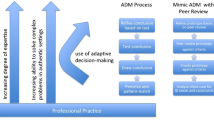Abstract
A major challenge for learning theories is to illuminate how particular kinds of learning experiences and environments promote the development of expertise. Research has been conducted into novice-expert differences in various domains, but few studies have examined the processes involved in learners’ expertise development. In an attempt to understand the development of expertise in instructional design (ID) among graduate students, this study aimed to investigate (1) the patterns of expertise development among ID learners over an extended period; (2) the roles of expert modelling, peer feedback, self-reflection and participation in a supportive learning community in learners’ expertise development; and (3) the interactions of individual differences and the learning environment in learners’ expertise development. A qualitative design was used to investigate students’ expertise development across a range of dimensions. The participants were two cohorts of 11 graduate students in a program on instructional psychology and design. Data, including observations, interviews, design documents, metacognitive essays and peer feedback, were collected for triangulation and in-depth analysis. The results showed that the two cohorts exhibited similar patterns in their ID expertise development. These development processes were influenced by both self-processes and social influences. Self-processes are determined by the perceptions, motivation and prior knowledge that students bring into the learning environment. Social influences are characterised by a learning community that encourages peer interactions and feedback and is supported by expert modelling and scaffolding.
Similar content being viewed by others
References
Alessi, S. M., & Trollip, S. R. (2000). Multimedia for learning: Methods and development (3rd ed.). Needham Heights, MA: Allyn & Bacon.
Anderson, J. R. (1985). Cognitive psychology and its implications (2nd ed.). New York: Freeman.
Anderson, J. R. (2000). Cognitive psychology and its implications (5th ed.). New York: Worth Publishers.
Bereiter, C., & Scardamalia, M. (1993). Surpassing ourselves: An inquiry into the nature and implications of expertise. Chicago: Open Court Publishing Company.
Bielaczyc, K., & Collins, A. (1999). Learning communities in classrooms: A reconceptualization of educational practice. In C. M. Reigeluth (Ed.), Instructional-design theories and models: A new paradigm of instructional theory (pp. 269–292). Mahwah, NJ: Lawrence Erlbaum Associates.
Bransford, J. D., Brown, A. L., & Cocking, R. R. (Eds.). (2000). How people learn: Brain, mind, experience, and school. Washington, DC: National Academy Press.
Brown, J. S., Collins, A., & Duguid, P. (1989). Situated cognition and the culture of learning. Educational Researcher, 18(1), 32–42.
Coffey, A., & Atkinson, P. (1996). Making sense of qualitative data: Complimentary research strategies. Thousand Oaks, CA: Sage.
Collins, A., Brown, J. S., & Holum, A. (1991). Cognitive apprenticeship: Making thinking visible. American Educator, 15(3), 6–11, 38–46.
Collins, A., Brown, J. S., & Newman, S. E. (1989). Cognitive apprenticeship: Teaching the crafts of reading, writing, and mathematics. In L. B. Resnick (Ed.), Knowing, learning, and instruction: Essays in honor of Robert Glaser (pp. 453–494). Hillsdale, NJ: Lawrence Erlbaum Associates.
Creswell, J. W. (1998). Qualitative inquiry and research design: Choosing among five traditions. Thousand Oaks, CA: Sage.
Dreyfus, H. L., & Dreyfus, S. E. (1986). Mind over machine: The power of human intuition and expertise in the era of the computer. New York: The Free Press.
Dweck, C. S., & Leggett, E. (1988). A social-cognitive approach to motivation and personality. Psychological Review, 95, 256–273.
Eccles, J. S., Adler, T. F., Futterman, R., Goff, S. B., Kaczala, C. M., Meece, J. L., et al. (1983). Expectancies, values and academic behaviors. In J. T. Spence (Ed.), Achievement and achievement motives (pp. 75–146). San Francisco: W. H. Freeman.
Ertmer, P. A., & Cennamo, K. C. (1995). Teaching instructional design: An apprenticeship approach. Performance Improvement Quarterly, 8(4), 43–62.
Flavell, J. H. (1987). Speculations about the nature and development of metacognition. In F. E. Weinert & R. H. Kluwe (Eds.), Metacognition, motivation, and understanding (pp. 21–29). Hillsdale, NJ: Lawrence Erlbaum Associates.
Flavell, J. H. (1991). Understanding memory access. In R. Hoffman & D. Palermo (Eds.), Cognition and the symbolic processes: Applied and ecological perspectives (pp. 281–299). Hillsdale, NJ: Erlbaum Associates.
Goel, V., & Pirolli, P. (1989). Motivating the notion of generic design within information-processing theory: The design problem space. AI Magazine, 10, 19–36.
Goel, V., & Pirolli, P. (1992). The structure of design problem spaces. Cognitive Science: A Multidisciplinary Journal, 16(3), 395–429.
Greene, B. A., DeBacker, T. K., Ravindran, B., & Krows, A. J. (1999). Goals, values, beliefs as predictors of achievement and effort in high school mathematics classes. Sex Roles, 40(5/6), 421–458.
Hardré, P. L., Ge, X., & Thomas, M. K. (2005). Toward a model of development for instructional design expertise. Educational Technology, 45(1), 53–57.
Hardré, P. L., Ge, X., & Thomas, M. K. (2006). A qualitative study of the development of instructional design expertise. Performance Improvement Quarterly, 19(4), 63–90.
Hatano, G. (1990). The nature of everyday science: A brief introduction. British Journal of Developmental Psychology, 8, 245–250.
Julian, M. F., Kinzie, M. B., & Larsen, V. A. (2000). Compelling case experiences: Performance, practice and application for emerging instructional designers. Performance Improvement Quarterly, 13(3), 164–201.
Morrison, G. R., Ross, S. M., & Kemp, J. E. (2004). Designing effective instruction. Hoboken, NJ: John Wiley & Sons.
Perez, R. S., & Emery, C. D. (1995). Designer thinking: How novices and experts think about instructional design. Performance Improvement Quarterly, 8(3), 80–95.
Pintrich, P. R. (2000). The role of goal orientation in self-regulated learning. In M. Boekaerts, P. R. Pintrich, & M. Zeidner (Eds.), Handbook of self-regulation: Theory, research, and applications (pp. 451–502). San Diego, CA: Academic Press.
Schraw, G. (2006). Knowledge: Structures and processes. In P. A. Alexander & P. H. Winne (Eds.), Handbook of educational psychology (2nd ed., pp. 245–263). Mahwah, NJ: Lawrence Erlbaum Associates.
Schunk, D. H., & Zimmerman, B. J. (2006). Compentence and control beliefs: Distinguishing the means and ends. In P. A. Alexander & P. H. Winne (Eds.), Handbook of educational psychology (pp. 349–367). Mahwah, NJ: Lawrence Erlbaum Associates.
Smith, M. C., & Pourchot, T. (1998). What does educational psychology know about adult learning and development? In M. C. Smith & T. Pourchot (Eds.), Adult learning and development: Perspectives from educational psychology (pp. 3–11). Mahwah, NJ: Lawrence Erlbaum Associates.
Smith, P. L., & Ragan, T. J. (2005). Instructional design (3rd ed.). Hoboken, NJ: Wiley.
Stake, R. E. (2005). Qualitative case studies. In N. K. Denzin & Y. S. Lincoln (Eds.), The Sage handbook of qualitative research (3rd ed., pp. 443–466). Thousand Oaks, CA: Sage Publications.
Stepich, D., Ertmer, P., & Lane, M. (2001). Problem-solving in a case-based course: Strategies for facilitating coached expertise. Educational Technology Research and Development, 49(3), 53–69.
Sternberg, R. J. (1996). Cost of expertise. In K. A. Ericsson (Ed.), The road to excellence: The acquisition of expert performance in the arts and sciences, sports, and games (pp. 347–354). Mahwah, NJ: Lawrence Erlbaum.
Vygotsky, L. S. (1978). Mind in society. Cambridge, MA: Harvard University Press.
Wigfield, A., & Eccles, J. S. (2000). Expectancy-value theory of achievement motivation. Contemporary Educational Psychology, 25(1), 68–81.
Wineburg, S. S. (1998). Reading Abraham Lincoln: An expert-expert study in the interpretation of historical texts. Cognitive Science, 22, 319–346.
Wineburg, S. S., & Fournier, J. E. (1994). Contextualized thinking in history. In M. Carretero & J. D. Voss (Eds.), Cognitive and instructional processes in history and the social sciences (pp. 285–308). Hillsdale, NJ: Erlbaum Associates.
Winner, E. (1996). The rage to master: The decisive role of talent in the visual arts. In K. A. Ericsson (Ed.), The road to excellence: The acquisition of expert performance in the arts and sciences, sports, and games (pp. 271–301). Mahwah, NJ: Lawrence Erlbaum.
Yin, R. K. (2003). Case study research: Design and methods (3rd ed.). Thousand Oaks, CA: Sage Publications.
Zimmerman, B. J., & Campillo, M. (2003). Motivating self-regulated problem solvers. In J. E. Davidson & R. J. Sternberg (Eds.), The psychology of problem solving (pp. 233–262). Cambridge: Cambridge University Press.
Author information
Authors and Affiliations
Corresponding author
Rights and permissions
About this article
Cite this article
Ge, X., Hardré, P.L. Self-processes and learning environment as influences in the development of expertise in instructional design. Learning Environ Res 13, 23–41 (2010). https://doi.org/10.1007/s10984-009-9064-9
Received:
Accepted:
Published:
Issue Date:
DOI: https://doi.org/10.1007/s10984-009-9064-9




